- Home
- S. A. Barton
I Pledge Allegiance Page 2
I Pledge Allegiance Read online
Page 2
As usual Pa is gone to work by the time I come downstairs. Ma has warm pancakes waiting for me and I eat them like I'm starving, not tasting them. I set the fork down, regretting. Her pancakes are the best I've tasted anywhere; no restaurant can outdo them. They didn't deserve to be wolfed. And, whatever happens, it is about as certain as certain can be that I will never taste them again.
“I'm going early, didn't sleep very good,” I say. “I'm going to walk the last half mile, try to wake up. Maybe I'll get a coffee, too.”
We hug, exchange I love yous. I manage to hold back tears until I'm in the autocab. I blink them back, wipe them off on my sleeve.
“The hell's in my eye,” I mutter, just in case someone happens to be listening in.
I have nothing to remember Ma by, nothing but my memories. It's like she's dying, I'm dying.
#
“You gotta run, kid,” a voice says into the middle of a thick black unconsciousness that sticks to me like glue as I struggle to wake. The voice is feminine, hoarse, and comes fast, almost panicked. Its owner shakes my shoulder so hard my teeth clap shut on the end of my tongue and the pain jolts my eyes open. I'm curled up like a fetus, lying in the center of the disassembled walls and air-bubble pads of a fragile-shipment packing crate. I roll to my hands and knees and the floor rocks under me; my hands blur and double in my vision. I shake my head like a wet dog.
A volley of gunshots comes from somewhere near and a ricochet howls.
“Dammit, kid,” the voice says. My vision clears a bit: I'm on concrete. It's old, cracked, but clean. I look toward the voice. A woman, dark clothes, light face smeared with soot or greasepaint. Thick muscles roll in her arms as she raises them to shoulder height. She's on one knee, a black pistol in her hand, holding the bumper step of the back of a delivery truck with the other; we're in an outdoor loading dock. We're at the bottom, concrete walls on both sides, and she's shooting up the ramp. Boom boom boom, she fires, then pulls herself back behind cover and more gunfire answers her, chipping concrete off the back of the dock. Another ricochet whines, and I cringe.
“You've got to get it together now, kid,” she says to me. “I know it's hard, I know the sedatives are making it harder, but you have to get on your feet and run for your rocket right now.” I stare at her. Run for my rocket? She hooks a thumb back toward the concrete wall behind us. I was just buying coffee a minute ago...
“I've got one magazine left when this one's empty—and it's almost empty.” she says, and leans back out to shoot again.
Something's gone very wrong, I think. I get my feet under myself, turn to look where she pointed with her thumb. The truck we're behind is just a few feet shy of the wall at the back of the dock. Up about five feet, the loading door is partly opened, just a couple of feet. More gunfire rattles and bullets punch through the door high up and the whole thing shudders like a beach towel caught in a gust, shrieking against its tracks. It's dark beyond the door I can't see a thing outside—but anything is better than being out here with all the gunfire. I leap, reaching forward across the warehouse floor with my arms and throwing a leg up. I jerk my head and weight hard as I can at the opening and roll in under the door; the concrete batters my ears, the back of my head, my cheek as I roll. Inside, skinny fingers of sunlight play with the dust in the air through the bullet holes, waving as the steel rollup door flexes; the dust still wafts from the gouges in the cinderblock wall where the bullets have struck. To the left, out of the small receiving area, a high-ceilinged warehouse widens out.
In the center, I see as I crawl forward on hands and knees, is a very tall narrow cone, base wide across a pad of plastic pallets on the floor, nose almost touching the ceiling. Two people are helping someone into a door on the side of the cone, a narrow broom-closet door. The someone is limp, feet dragging. Two more people come around from the other side of the rocket. All four (not counting the limp one) wear dark colors, blues and blacks.
“Come on,” one says, and takes my left hand. The other, silent, takes my right. They're both hooded, dark, eyes behind tinted goggles.
“This is your rocket out. Usually people are unconscious for this. It'll be rough, lots of turbulence, but you can stand it. Try not to puke or you'll have to live with the stink until you're picked up in LEO,” the one with my left hand says.
“LEO?”
“Orbit. Arms through straps. Butt back. Don't remove your straps, if you do and the rocket has to take evasive action you'll rattle around like dice in a cup. Legs against the padding. Good.” The straps are tight, claustrophobic in a claustrophobic space; if I was much bigger I wouldn't fit at all. The one doing the talking turns away from me once I'm secured.
“Dog his door. They're go and we need to get gone—if we still can, in this mess.” He runs. The silent one, who took my right hand, pauses. Lifts his goggles.
“I love you, Keshawn. Son,” he says. “We'll follow one day, if we can.” Pa pulls his goggles back down.
“What? Pa...” I say, pushing against the straps, knowing I have to stay put, out of words. My jaw works, trying to find some, but there's nothing. I was so wrong. If I'd trusted him, he could have helped.
If I'd trusted him, I could have said...
“I love you, I'm sorry!” bursts out of my mouth as he pulls the door from its recess in the hull, ready to lock me in.
“I know. You did your best,” he says, and then the door is closed.
Less than a minute later, a rumble builds beneath me, grows to a roar, builds more, more, greater, fills my ears, my head, thunders in my chest and seizes me in the grip of a god and tries to pull me down through the straps and mash me into a puddle on the floor. Then there's a triple bang, staccato like machine gun fire. It throws everything sideways and the side of my head batters the padding and it's dark again.
#
Consciousness. Paralysis. Darkness behind closed eyes. A thin pad on a hard table; an ache across the shoulder blades.
She: “Is he waking? I need him under a little longer.”
He: “He's fine. He's a kid; they're tough at that age. Let him wake.”
She: “Youth isn't proof against brain bleeds. He got knocked around good. And I want a deep body scan before we wake him. If we do. Put him back down.”
He: “His parents are on our side, down there.”
She: “Which means jack shit. No exceptions, he gets a scan and a thorough cavity check. They're tricky down there and if a bomb gets by it won't be on my watch.”
The darkness steals in again, soft and insistent.
#
There is an insistent mellow electronic beeping, not quite as annoying as a wake-up alarm for school.
My eyes squeeze shut harder; the light is harsh even through my eyelids, and warm, almost hot. It's everywhere, I realize, laying across my whole skin from head to toe like an immaterial blanket. A fan whirs; breeze moves over me, toe to head, head to toe, a caress. It feels good; I feel lazy.
“Mmmmmm,” I say, and stretch. Joints crackle down my spine, in my shoulders, my arms, my legs. I open my eyes look toward the door. It's institutional, fake wood, not my bedroom door at all, and I sit up all at once, jerky. I shade my eyes with my hand: the light is harsh and way too bright. The room is as unfamiliar as the door, institutional—hospital bed with a metal rail raised at my left arm, gray plastic chair beside the bed I'm in, rectangular monitor screen on the wall facing me, dark. There's an IV in the pit of my right elbow, feeding milky fluid in. I remember the rocket boosting, the gunfire, the voices. If we wake him.
Pa. I feel a swell of regret but there's no time for it to grow.
“His cardiovascular activity is up, he's either waking or awake already.” A male voice—a third male voice, not one of the two from the floating paralytic interlude—approaching from outside. The door swings open.
Nude under the sunlamps, I look for a blanket that isn't there, then grab my pillow to cover my crotch, too late. The male nurse coughs.
I blush,
hard enough that I'm pretty sure it's visible even through the darkness of my skin.
“You're in good spirits,” the female doctor says, suppressing a smile. “Any headache?”
I pause for a moment to be sure. “No.”
“Double vision?”
Pause. “No,” I say again.
“Good. You suffered a significant concussion, but you've also been in a medically induced coma for three days. Gave you lots of good healing time.”
“I'm glad you decided to wake me up,” I say, without venom, feeling like I really should have put some there. I recognize her voice from the darkness.
She slides the plastic chair to my bedside, takes a blanket from the cabinet on the wall, looks pointedly at one of the medical monitors while I cover myself and replace my pillow. The nurse occupies himself also, adjusting the lights: the normal room lights come up, the sunlamps go dark.
She sits by my right hand in the gray plastic chair, facing me. Closes the IV and removes it, tapes down a gauze pad over the blood. The nurse removes the IV stand and lets the door close behind him. He doesn't come back.
“I can tell you about that,” she says, after the door is closed. She's not smiling or frowning. She's waiting.
I feel lightheaded. My empty stomach growls. I fall back on the pillow, wishing I could go back to sleep, wishing for time to think.
Wondering where my escape has really gotten me.
What has it gotten me? I stare at her. Around her neck, a fine silver cross hangs and I blink at it. Goosebumps break out on my arms and legs. One nation under the Lord, Jesus Christ. Is there a state religion here, too? A grooming code? Gender-role enforcement?
“Are you really free? Or is that just a stupid rumor going around the Union?” I finally ask.
She follows my eyes, pulls the cross out with her fingers and dangles it in the light.
“I'm Christian, but you don't have to be. Not here,” she says. “And the state doesn't decide what 'Christian' means.” She lets the cross drop, lifts her left hand, shows me the single ring she wears, a simple silver band. “I married my wife here,” she says. “Could you marry your husband in the NAU?”
“I'm not gay,” I say reflexively. Homosexuality is a felony.
“That's not what I meant,” she says. “I mean, if you wanted to. If that was you, could you? Of course not. I couldn't have married my wife. Not there. Here...” she turns her hand and her wedding ring glimmers in the light.
“So, yes. You're free.”
“Freedom is a slippery thing to define,” she says. “You won't go hungry here, or without shelter, or without air. And believe me, it costs money and work to keep us breathing. Nobody will tell you how or if to worship, or how long to wear your hair, or throw you in jail if you call the President an idiot. But there are laws, and there are taxes, and there are things you have to know and do and participate in as a citizen. Things like hull puncture drills and putting in your time in Hydroponics-Atmospherics. Vital things. And we have to guard against people like the leaders of the NAU who call us enemy—and their agents. That's why you had to be thoroughly scanned before we woke you. They've sent bomb-bodies before. But back to the point, freedom is relative. You'll be more free here than you were there, but if you had dreams of no responsibility and no rules...”
“No,” I say. “That wouldn't make sense.”
“You'd be surprised how many people get this far not making sense. Who think freedom means self-indulgence instead of participation in a society for mutual benefit. We can't afford to have anyone sit it out here.”
“I didn't think...” but she's barreling ahead, talking over me, intent on driving her point home.
“You'll have one more checkup tomorrow, now that you've recovered physically. And then you'll start to learn what it means to be a Citizen Applicant to the Solar Confederation. You'll be working hard by the end of the week—and I have other patients to see to.” She stands, walks to the door. “Rest up,” she says over her shoulder, and then the door is closed behind her, leaving me in silence.
The Solar Confederation. I have heard the name on the news. A godless den of depraved warmongers bent on dominating the cradle of humanity, Mother Earth. The newscasters can say their name aloud, and the politicians, but any NAU citizen with the slightest sense keeps it out of his mouth unless it's said at a rally, in led condemnation.
I had come to believe that anything the despotic leaders of the NAU hated so deeply must be its opposite. The opposite of oppression is freedom. Isn't it?
“Command monitor on, news,” I say aloud, and the monitor hears and turns itself on. At least voice control is the same here as there. “Panel four. Panel two. Panel five. Panel one,” I say, navigating successive six-square grid displays of entertainment classifications, finding a general national news channel. The categories are utterly familiar, so for a moment I feel at home. As I watch, I learn that the NAU is a godless den of depraved warmongers bent on dominating the greatest hope for the future of the human race, the Solar Confederation. I wonder just how far I've really come, in coming here.
Tomorrow, I will begin to learn.
#
“I pledge Allegiance to the flag
of the Solar Confederation
and to the Unity for which it stands,
One people, Indivisible,
with Liberty and Justice for All.”
#
I recite it from the screen with a smile, emphasizing the bolded words with a mask of enthusiasm. The menu won't advance unless I do.
#
ENTER BIOMETRIC SCAN OF FINGERPRINT TO CONTINUE
#
FINGERPRINT RECOGNIZED
SWIPE CREDIT/DEBIT CARD TO CONTINUE
#
APPROVED
SC $5.00/INSTRUCTIONAL HOUR
ENTER DNA IDENTITY SCAN TO CONTINUE
#
Five dollars! I hesitate, despite recognizing the fact that this is simply a different scale of currency. It's probably not so far from the half-quarter the NAU charged for the same hour in absolute value. Still, I have an uneasy feeling about building a debt before I've begun to work; on Earth, my parents were still paying my bills. I sigh and stick my thumb in the slot under the fingerprint scanner and a surface like fine sandpaper licks the skin like a cat's tongue. The screen displays a spinning sun with twenty-one rays in rainbow configuration: working. I can't skip this. I need to understand what I'm doing if I'm to earn my way, and to prove that I'm a willing immigrant who will contribute to my new home.
#
WELCOME KESHAWN BOLLING
Options
((1)) Citizenship: Yr1Mo1 Citizen Applicant: Lecture: Basic Obligations of the Citizen to the State
((2)) Civics: Yr1Mo1: Reading: Foundational Beliefs of the Solar Confederation
((3)) History: Yr1Mo1: Lecture: Pre-Independence
((4)) Vocational: Yr1Mo1: Practical Video Demonstration: Basics of Safety in a Hydroponics Workspace
I touch ((4)) and lean back in my chair, taking notes on the scratch paper provided in a tray beside the monitor.
#
For two years, I have been working in Hydroponics-Atmospherics, cleaning sludge out of algae tanks, reconstituting powdered sewage for fertilizing, harvesting greens and berries on my knees under endless black plastic racks. The doctor said I'd work hard, and I work hard. Five days a week, twelve hours a day. The other two days a week have an eight-hour school requirement to continue my education in the civic duties of the Solar Confederation citizen. By now, I know as much as a natural-born citizen. More than most, in fact.
I'm still waiting for my hearing to advance from Citizen Applicant to Provisional Citizen, and I will wait much longer. From some of the other immigrants here, I've heard that each step takes seven to ten years. A PC is eligible to work in service occupations, not just in menial jobs like the one I have now. Not much of an ambition.
I have also heard that while the habitats I work in and the others are
still all part of the Solar Confederation, the habitats farther out toward the asteroids and the loose sprawling nations of miners and colonists are much less suspicious of Earthers than the Earth-Luna system habitats I labor in now.
I have begun to leave discreet messages online, and digital notes in key ebook files on readers from the library...
See more from S.A. Barton at https://sabarton.com
On Twitter at https://twitter.com/tao23
And on Facebook at
https://www.facebook.com/pages/S-A-Barton/312607662122218

 Maiden Flight
Maiden Flight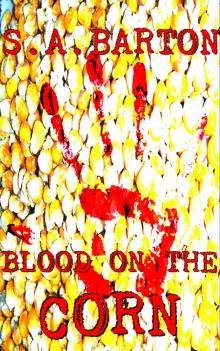 Blood on the Corn
Blood on the Corn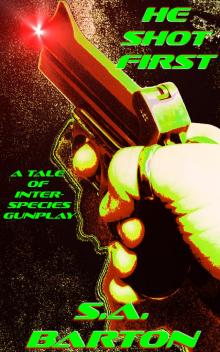 He Shot First
He Shot First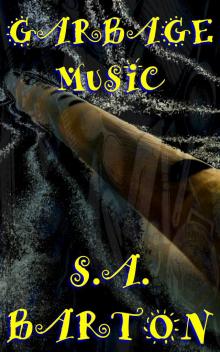 Garbage Music
Garbage Music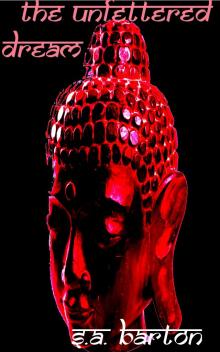 The Unfettered Dream
The Unfettered Dream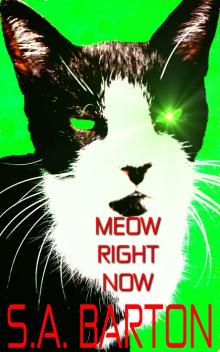 Meow Right Now
Meow Right Now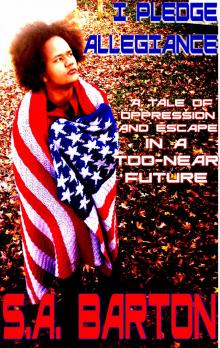 I Pledge Allegiance
I Pledge Allegiance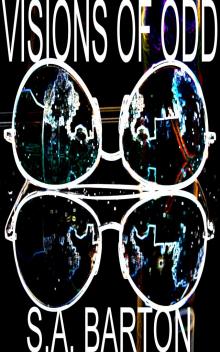 Visions Of Odd
Visions Of Odd Spoken Wood
Spoken Wood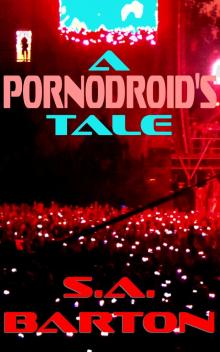 A Pornodroid's Tale
A Pornodroid's Tale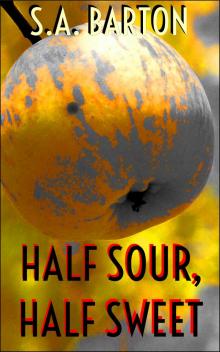 Half Sour, Half Sweet
Half Sour, Half Sweet